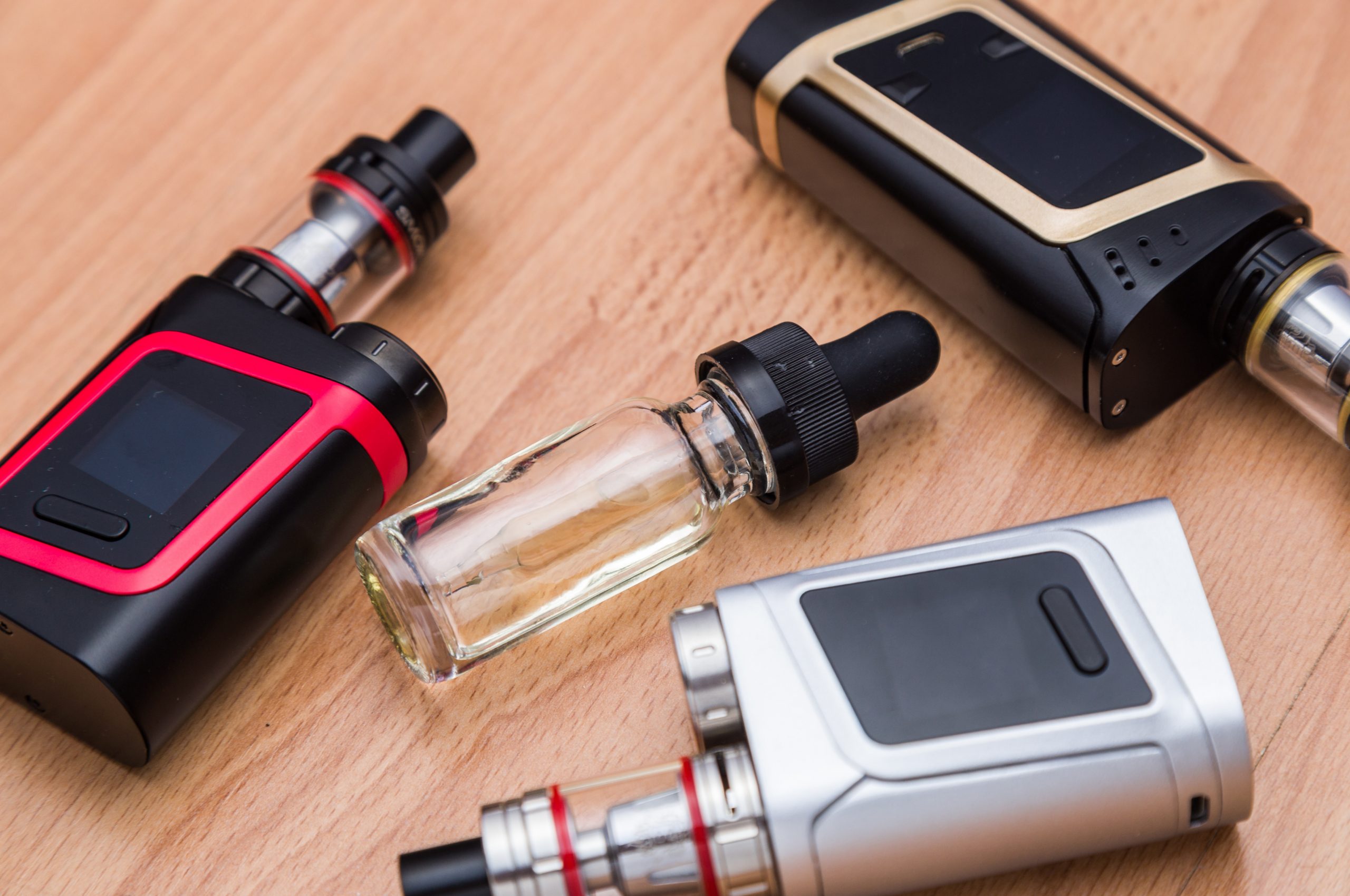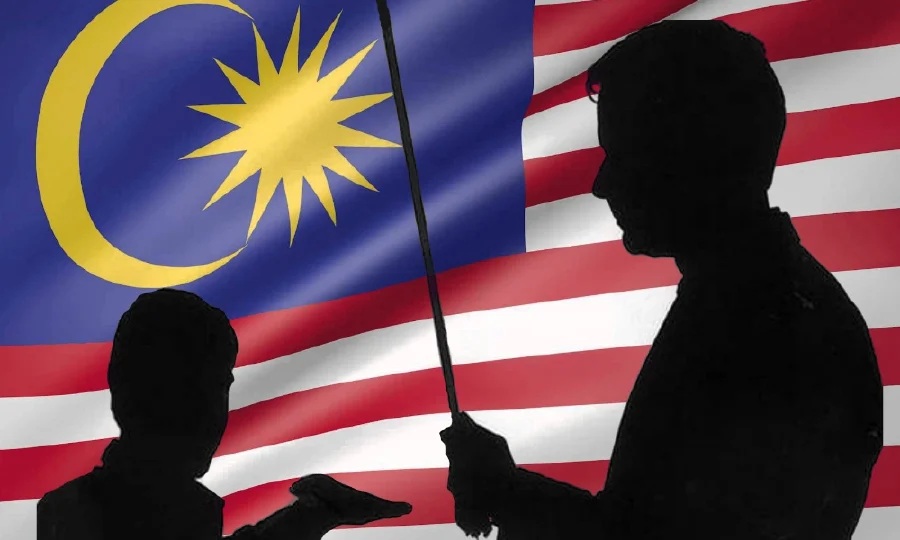Early appeals from the Selangor Menteri Besar and strong statements from the Consumers’ Association of Penang (CAP) helped shape the policy conversation. But it was the intensity of public dialogue across platforms, communities, and age groups that ultimately pushed vape control into the national spotlight.
From public responses to the 2025 vape ban in Malaysia to the impact of Petronas job cuts , our coverage sheds light on key national issues. Visit our news section for more insights and articles.
📆 Timeline of Public Reactions
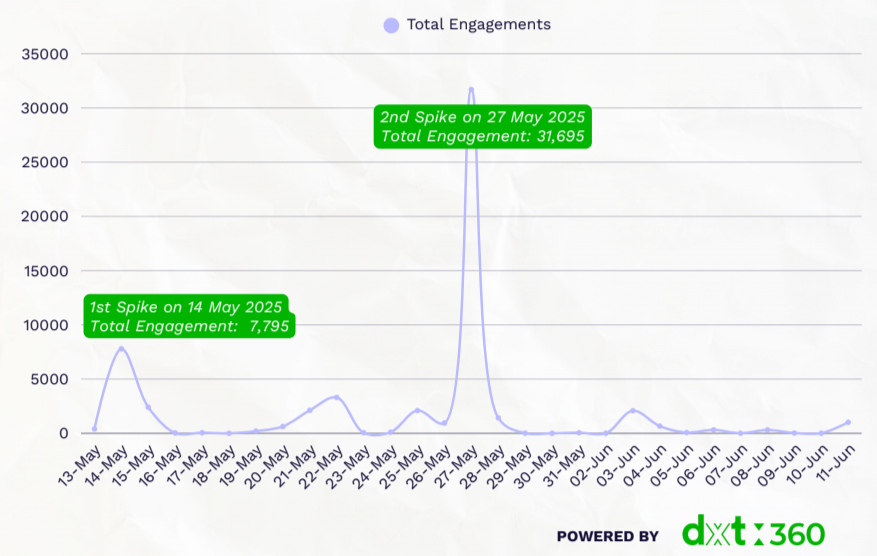
Online engagement surrounding the vape ban surged in distinct waves: There was a significant increase in public attention and online discussions over time as the issue gained prominence.
14 May 2025:
The first major spike occurred after CAP urged all states to ban vape sales, citing concerns about youth exposure and addiction. Engagements exceeded 7,700 as public attention turned sharply toward state accountability.
27 May 2025:
The highest peak followed when Selangor’s MB announced a pending decision and Melaka’s top police official proposed a total ban in response to rising drug use among students. This announcement generated over 31,000 engagements in a single day, reflecting a groundswell of public reaction.
Additional peaks on 22 May, 25 May, and 3 June reflected continuous online momentum, driven by calls for a consistent, nationwide approach. By mid-June, discussions tapered, suggesting that online interest was closely tied to visible state-level developments and announcements.
🌐 Where Did the Conversation Happen?
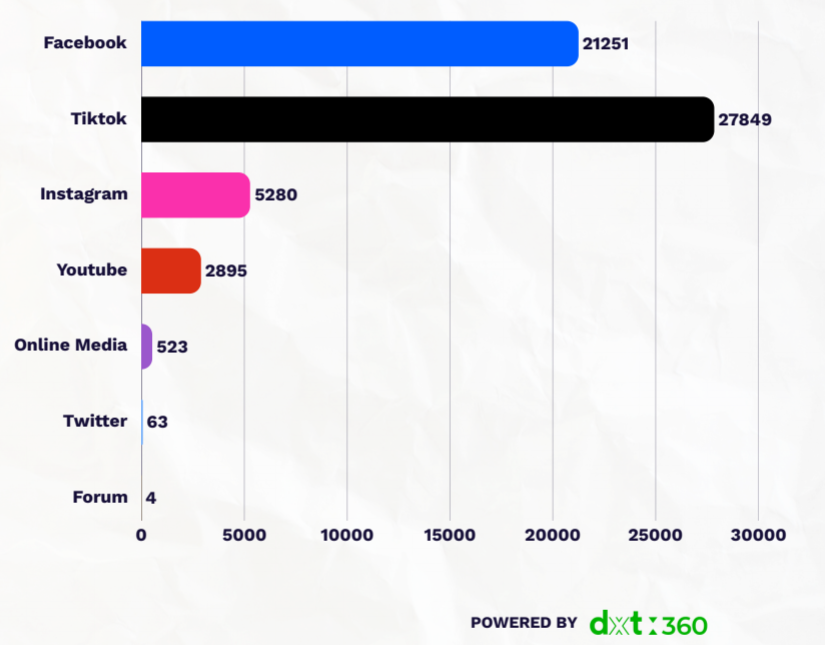
Analysis of total engagement revealed that younger, mobile-first audiences dominated the conversation:
TikTok and Facebook saw the highest activity, combining image-based commentary with humour, outrage, and peer sharing.
🔥 Key Topics That Drove the Conversation
Social media commentary on the vape ban reflected five dominant public concerns:
1. Support for the Vape Ban (40%)
Many netizens welcomed the vape ban as a necessary and responsible move by authorities to address public health concerns. States such as Perlis, which moved quickly to implement the ban, were praised for their proactive stance.
Netizens framed the ban as a timely intervention to prevent the further normalisation of vaping, particularly among youth. It was widely perceived as a step towards protecting future generations from addiction and long-term health risks. Calls for consistent enforcement across all states were prominent, as many viewed the ban as a reflection of national values and social responsibility.
2. Double Standards in Policy and Enforcement (20%)
Some netizens raised concerns about inconsistencies in health policy, questioning why vape products were prohibited while other substances — including cigarettes, alcohol, and gambling — remained legally accessible.
These comparisons prompted wider reflections on policy credibility and public trust. For this group, the vape ban alone appeared insufficient. They called for a more comprehensive and consistent framework that addresses all forms of substance-related harm, warning that selective enforcement could erode public confidence in long-term health strategies.
3. Youth Vulnerability and Institutional Responsibility (20%)
Some netizens focused on the increasing accessibility of vape products among schoolchildren and teenagers. Stories of youth vaping in classrooms, public areas, and even within family environments circulated widely.
This group expressed alarm over what they viewed as a failure by schools, parents, and relevant authorities to intervene early enough. Many urged the Ministry of Health (KKM) to lead a national education campaign to raise awareness of vaping’s risks. The theme underscored a broader concern about intergenerational health and the perceived need for urgent, preventive action.
4. Economic Impact on Vape Sellers and Small Businesses (10%)
A few netizens expressed sympathy for those financially affected by the ban — particularly small-scale vape retailers, bumiputera entrepreneurs, and informal traders who relied on vape sales for income.
Concerns were raised about job losses, business closures, and the lack of a structured support system for those displaced by the policy. While most acknowledged the health motivation behind the ban, this minority called for transitional support, including compensation, reskilling programmes, or phased enforcement. Their comments served as a reminder that regulation carries economic implications that must be addressed equitably.
5. Enforcement Challenges and Policy Effectiveness (10%)
A few netizens questioned whether the ban could be effectively enforced, especially given the continued availability of vape products through online channels and informal sales.
🔎 Word Cloud Analysis: What Malaysians Were Really Talking About
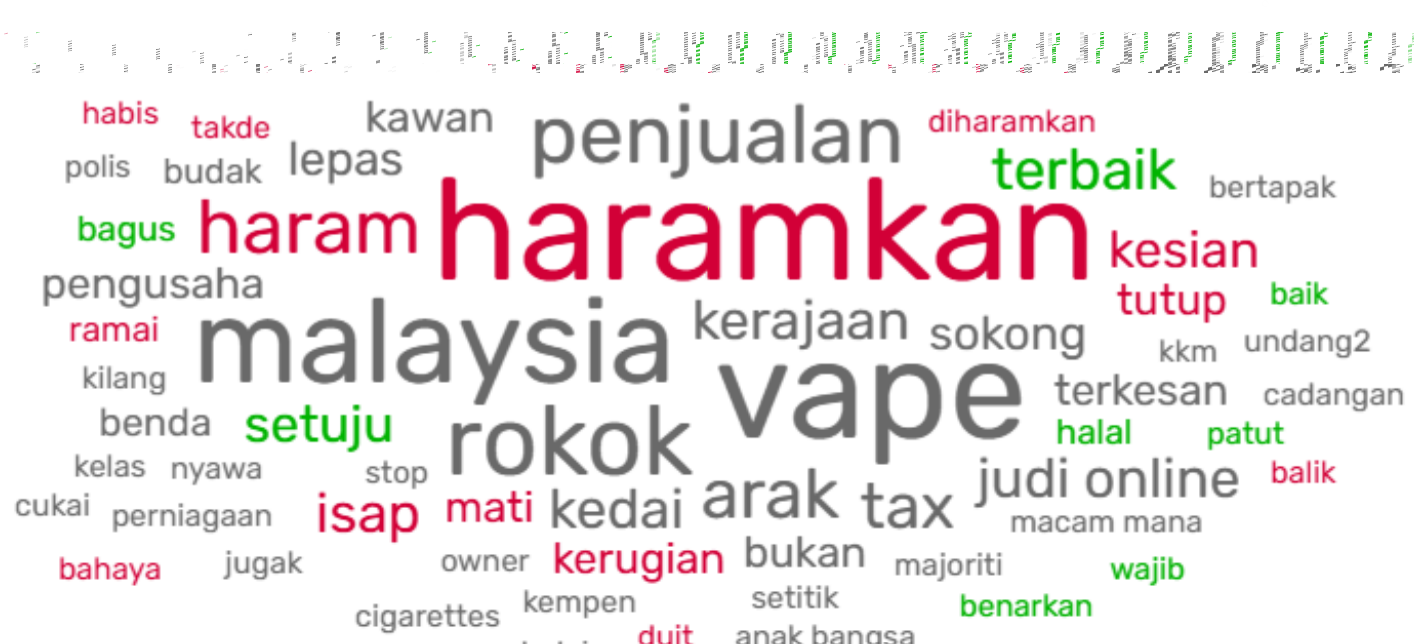
1. Public Support and Moral Justification
Keywords such as “haramkan”, “sokong”, “setuju”, “bagus”, and “baik” signalled strong public endorsement of the vape ban. Many netizens regarded the move as morally necessary and socially responsible, interpreting it as a crucial step towards restoring public health and protecting societal norms.
There was a clear desire for nationwide implementation, with piecemeal enforcement by individual states criticised as inadequate. The prevalence of affirmative terms suggested that the ban was viewed not merely as a regulatory measure, but as a reflection of shared values — a collective responsibility to curb harm and uphold community well-being.
2. Vape vs Cigarettes, Alcohol, and Gambling
Keywords such as “rokok”, “arak”, “judi online”, “halal”, “cukai”, and “tax” highlighted widespread concerns over policy inconsistency. Some netizens questioned why vape was targeted while cigarettes, alcohol, and gambling — which were also associated with health or moral risks — remained legally accessible.
This theme revealed underlying scepticism about the sincerity of public health policies. Many attributed the disparity to revenue protection, suggesting that taxable products were shielded due to their economic contribution. The presence of religious and regulatory terms such as “halal” and “cukai” indicated that the debate extended beyond health, touching on perceived hypocrisy and contradictions in policy logic.
3. Youth Harm and the Role of Authorities
Keywords including “budak”, “nyawa”, “ramai”, “kempen”, “kkm”, and “stop” underscored public anxiety over the impact of vaping on young people. Some netizens shared accounts of schoolchildren and teenagers gaining easy access to vape products, raising urgent calls for institutional intervention.
There were strong appeals for the Ministry of Health (KKM) to spearhead nationwide awareness campaigns and enforce stricter regulations. The prominence of terms like “nyawa” (lives) and “kempen” (campaign) reflected the emotional weight of this narrative, positioning youth protection as both a policy and moral priority.
4. Business Losses and Economic Disruption
Keywords such as “kedai”, “owner”, “peniagaan”, “kerugian”, “duit”, “tutup”, and “habis” revealed the economic anxieties experienced by vape business owners. A few netizens voiced concern about job losses and income disruption, particularly for small-scale entrepreneurs and bumiputera traders who relied heavily on vape-related sales.
The abrupt nature of the ban, coupled with limited discussion of transition support, fuelled criticism about the lack of a structured exit strategy. For these individuals, terms like “tutup” (close) and “kerugian” (loss) conveyed a sense of vulnerability. The conversation raised important questions about whether economic impacts were sufficiently considered during policy planning and rollout. Some netizens also speculated about the role of large companies, including major tobacco and vape corporations (Inc), in shaping the market and influencing policy outcomes.
📊 Social Sentiment Breakdown
Sentiment analysis of the overall conversation showed:
The sentiment analysis of public reactions to the vape ban reflected a largely positive outlook, with 70% of comments expressing support. Many netizens viewed the measure as timely and necessary to protect young people and to prevent the further normalisation of vaping. States that acted swiftly were commended, and there were consistent calls for nationwide coordination.
20% of comments conveyed negative sentiment, focusing primarily on the economic impact for vape sellers and perceived inconsistencies in enforcement. Some questioned why other harmful substances remained legal, arguing that the approach appeared selective and unfair.
The remaining 10% of comments were neutral, comprising factual observations about timelines, enforcement procedures, and public announcements. These reflected a general demand for clarity on how the policy would be applied across different states.
💬 What Netizens Were Saying
Online comments ranged from humorous to heartfelt:
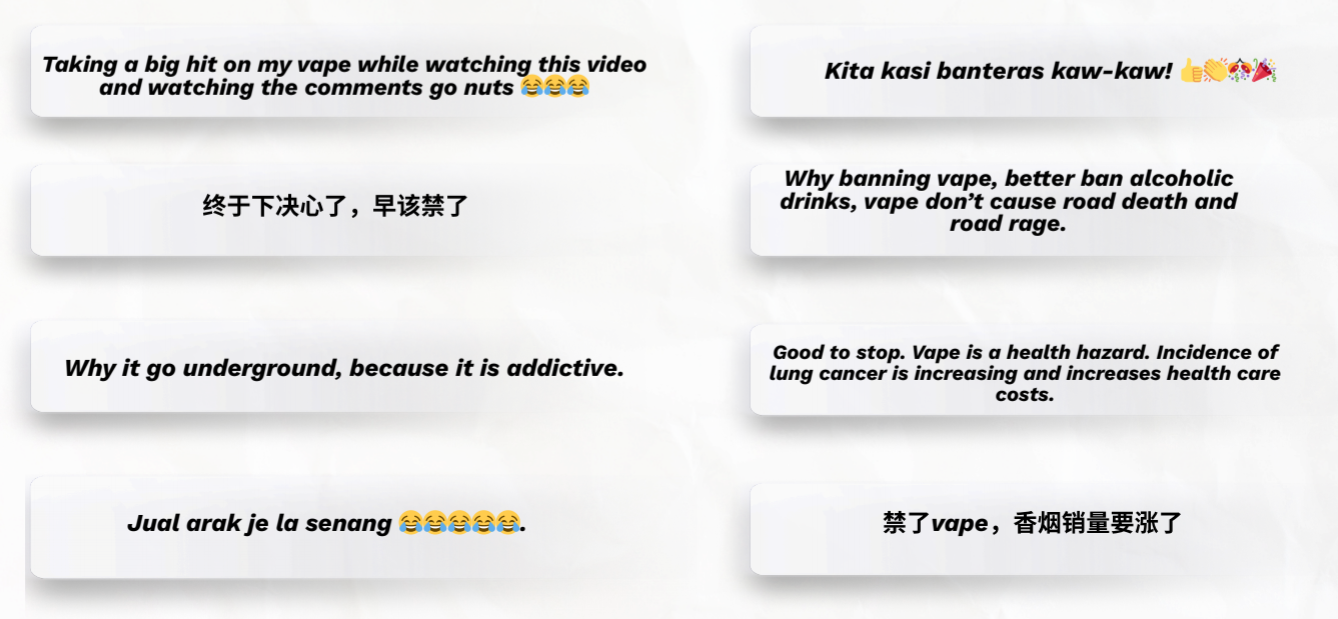
This diverse expression highlighted how a single policy move engaged every corner of Malaysian digital culture — from policy watchers and business owners to schoolteachers and health advocates. Online forums and social media became the primary place for Malaysians to share their views and experiences related to vaping.
📌 Final Takeaways
🇲🇾 National Morality and Health Took Centre Stage
The vape ban ignited a sense of moral urgency. Malaysians across demographics united under the banner of protecting the next generation. This was more than policy—it was a cultural flashpoint.
🧠 The Public Demanded Consistency and Clarity
The backlash wasn’t against the ban itself, but against selective enforcement and lack of planning. The public expected comprehensive, coordinated, and consistent health strategies.
📣 Social Media Was the Battleground
From TikTok duets to Facebook debates, public pressure played a clear role in influencing the national narrative. Public sentiment didn’t just reflect opinion—it shaped authority response.
📉 The Economic Conversation Remains Unresolved
Small sellers, especially from underserved communities, highlighted gaps in the government’s approach. Without transition strategies or support packages, the ban risks deepening economic inequality.
🔍 People Want Substance, Not Just Statements
This wasn’t a story of blind support or rejection—it was a call for better governance. Netizens weren’t just voicing feelings. They were demanding action, fairness, and long-term solutions.
📊 This report was powered by data gathered via DXT360 between 13 May – 11 June 2025.
📧 Email us: info@dataxet.nama.com.my
📱 LinkedIn: Dataxet Malaysia
📱 Facebook: Dataxet Malaysia

